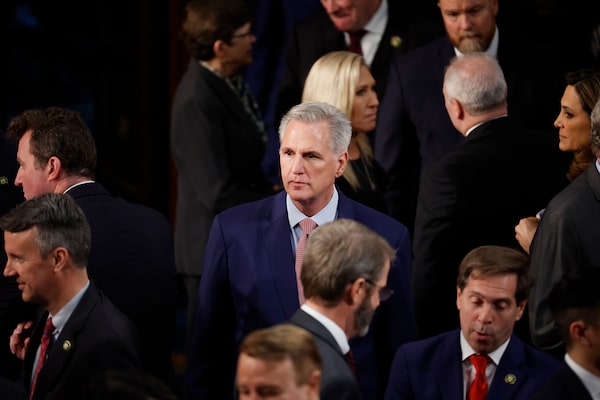
U.S. House Minority Leader Kevin McCarthy walks among members of the House in between roll call votes for Speaker of the House of the 118th Congress on Jan. 3.Chip Somodevilla/Getty Images
Two Januarys ago, the United States Capitol was convulsed in a bitter dispute over who should be the most powerful figure in Washington. This week, an acrid dispute over who should be the second-most powerful figure in Washington produced yet another scene of upheaval and insurrection – peaceful by contrast, but disruptive and unsettling nonetheless.
Being contested in each January struggle was far more than the identity of the next president or of the next speaker of the House of Representatives.
Instead the stakes in both conflicts were far greater: whether the course of American politics follows well-trod paths, whether the political class of the country is able to govern, and whether the internal conflicts and contradictions of one of the major political parties contaminates the entire system.
In the three-ballot impasse over who should become House speaker, the divisions that have poisoned American politics were in full view, visible not only by members of Congress and by the country beyond, but also worldwide, where governmental stability in the United States has been one of the vital touchstones and enduring assumptions of global politics.
Amid those tensions, and with the children of incoming lawmakers observing the chaos as they witnessed their parents’ first hours in what is known as the “people’s house,” Representative Kevin McCarthy of California struggled to do what party leaders have done with little opposition for a century: ascend to the speaker’s rostrum with ease, and without compromising concessions to party rebels. Instead, Mr. McCarthy’s decade-long quest for the speaker’s gavel disintegrated into a round-robin of concessions to unsatisfied party rebels, a week-long campaign that took the form of the pitiful in full pursuit of the votes of the pitiless.
And as the House moved into multiple ballots for speaker for the first time in exactly 100 years, the pillars of predictability tumbled in a wreckage that rendered the House floor the scene of a political tornado, with rubble strewn about and the foundations of the institution shaken. The principal expectation of life in the House – that presumptive speakers display strength, not weakness – fell by the wayside. What customarily is a ritual became a platform for rebellion.
In the passing of hour after hour, the stalemate seemed to deepen, the path to resolution blocked because the procedure for selecting the speaker does not provide for a winnowing of the field of candidates. The result: the persistent presence of an alternative to Mr. McCarthy as a repository of protest. At the same time, those who put Mr. McCarthy’s name into nomination – Representative Steve Scalise of Louisiana and Representative Jim Jordan of Ohio, himself an unwitting magnet for votes from the rebels, at least for now – seemed to have been setting themselves up, if not exactly auditioning, for the speakership if Mr. McCarthy stumbled.
Finally, the House – exhausted, frustrated, stymied – adjourned for the evening in the hope that the unresolved could be resolved, the irreconcilable could be reconciled, though the ways and means of doing so seemed to be beyond the ken of anybody, inside or outside the chamber. In short, none of the principals in the standoff seemed ready, willing, or able, to stand down or stand aside.
Lost in the turbulence on Capitol Hill – lost in the bathos while Mr. McCarthy retained an uncomfortable smile, forced, as the old crooner Nat King Cole might have sung, to smile though his heart was aching – was a culmination of a fundamental transformation of the character of the Congress that had been under way for years.
For generations, the House has operated with steadiness and discipline, its procedures designed to move the body forward without spectacle. At the same time, the Senate was a body without discipline, where debate could be carried on without limit and where the individual wishes of a single lawmaker or a small group could paralyze the chamber for hours stretching into days and weeks.
That is changing.
On Tuesday, the House – where 11 times since 1997, lawmakers have voted for candidates other than the presumptive speaker – seemed unable to choose a leader. Meanwhile, a few steps away in the Senate chamber – an apparent model of steadiness though not of serenity – Republican Senator Mitch McConnell of Kentucky exceeded the 16-year record as party leader held by former Democratic senator Mike Mansfield, who was the leader from 1961 to 1977.
In Mr. McCarthy’s desperation to win the position in the House, the California Republican agreed to permit as few as five dissidents to initiate a process that would remove the speaker from office. That concession to the GOP rebels would transform the House, which gives the majority outsized influence and power, into a temperamental twin of the Senate, where minorities have outsized power. Of the many uncertainties that provided the backdrop of Tuesday’s tumult, the prospect for this rules change is perhaps the most critical.
But what is known is that, on Tuesday anyway, the emphasis of the Republicans was on internecine tensions instead of presenting the House, and the public, with an issues roadmap for the 118th Congress. Lawmaker after lawmaker took the floor to speak of opposition to President Joe Biden and the Democratic-controlled Senate, but for hours the Republicans were not capable of healing the rifts among various strains in their own ranks.
 David Shribman
David Shribman